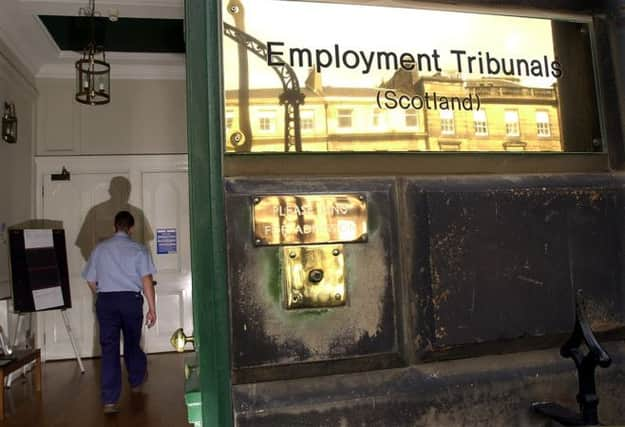Employer-friendly tribunal regime unlikely to be permanent


ACCORDING to figures released recently by the Ministry of Justice, the number of employment tribunal claims dropped by a staggering 70 per cent in the 18 months since July 2013.
Part of this trend can be attributed to the added encouragement to settle disputes in the workplace through ACAS rather than going through the legal process.
Advertisement
Hide AdAdvertisement
Hide AdHowever, it seems reasonable to infer that the larger part of the drop has been due to the fact that, also since July 2013, an employee with a grievance (either real or imagined) has been required to pay as much as £1,200 to bring a case to a hearing.
For many employers – perhaps the majority – the new regulations were simply a long overdue levelling of the playing field. Experience had convinced them that under the previous regime, employment tribunals had become something of a “dripping roast” for disgruntled employees whose claims of victimisation lacked veracity. In effect, the system encouraged spurious claims because the employee had little to lose in taking his or her grievance (genuine or not) to a tribunal.
Consequently, many employers – particularly those running small to medium enterprises without large human resources back-up – would often not contest claims despite feeling legally and morally in the right. Or, acting against their gut instinct, they felt obliged to compromise through a “deal” rather than let the matter drag on to the detriment of the business.
So the regulations in place since last year have been widely welcomed by bosses; unfortunately for them, particularly in Scotland, this has caused much discussion about whether or not this provides access to justice for employees.
Amid all the coverage given to the publication of the findings of the Smith Commission last month, little attention was given to the proposal that all powers over the management and operation of employment tribunals should be devolved from Westminster to the Scottish Parliament.
While the Commission recommended that all power to create laws for the workplace should remain with Westminster, both the SNP and Scottish Labour opposed the introduction of tribunal fees and their views have not changed. It is, therefore, very likely that if and when powers relating to employment tribunals are finally devolved to Holyrood, tribunal fees will be reduced significantly. The extent of the reduction is, of course, merely speculation at this stage but there is even a distinct possibility that fees could be removed completely.
Almost certainly, this will lead to a significant rise in the number of claims for unfair or constructive dismissal being raised by employees in Scotland. No doubt employer organisations will claim that such a scenario will make Scottish businesses less competitive in relation to those in other parts of the UK as well as being a disincentive to take on more staff.
However, with both the governing party and the main opposition in Scotland taking a strong anti-fees stand, this argument is likely to cut little ice at Holyrood.
Advertisement
Hide AdAdvertisement
Hide AdThe irony is that should tribunal fees be reduced or abolished altogether in Scotland, the adverse effect (from the employer point of view) could ripple south of the Border because of the distinct possibility of disgruntled employees in England and Wales being able to lodge a claim in Scotland in an attempt to avoid their own fee regime. This could arise when the employee with a grievance works in England but his or her employer resides in Scotland or also carries out business in Scotland.
This will not happen overnight. The Smith proposals will become law only if passed by Westminster after the general election next year and much will depend on the election result itself and whether the next Parliament will be “hung” or one party gains an overall majority. Only then will the Scottish Parliament have the authority to make reforms to the tribunal fees system, in which case any changes are unlikely to be implemented until 2016 at the earliest.
It is, however, worth noting that there are also currently cases being heard in both England and Scotland on which the issue is whether tribunal fees prevent access to justice. So even if the system is not eventually devolved to Edinburgh, the future of tribunal fees, on a UK basis, is not fully secured.
Consequently, bosses would be advised not to look upon an employer-friendly tribunal regime as something written in stone. Rather, they may wish to view the current regime as providing a period of breathing space during which time it would be appropriate to review all disciplinary procedures – in case their legal position related to workplace employment issues should take a turn for the worse.
•Andrew Wallace is a trainee solicitor in the employment department of Blackadders: www.blackadders.co.uk